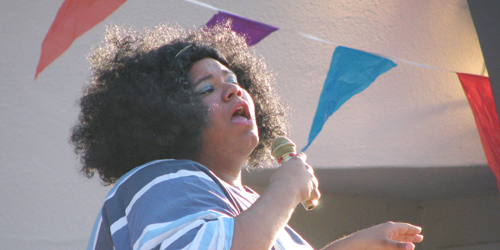By Bridgette M. Redman

Would that our language possessed a gender-neutral pronoun that did not render the objectification of "it" or the stiltedness of "one." Such a pronoun would have greatly aided the actors in Shakespeare West's "Much Ado About Nothing" in the adaptation that pairs a female Benedick with a female Beatrice and a male Claudio with a male Hero.
Without it, the opening night production had actors mixing their pronouns between the original ones Shakespeare chose and the ones that fit with the adaptation. Overall, the concept is one with great potential. For the story to truly work within the concept, Director Brian Carbine needed to take the adaptation a few steps further. For example, when Beatrice demands that Benedick perform her revenge in proof of Benedick's love, it makes no sense that she describes the revenge as a man's task. Benedick is no more a man than she is. Yes, the speech is a great one and the scene is necessary. So why not focus on what IS different about them, such as the fact that Benedick is a soldier. Let Beatrice bemoan the fact that a challenge of honor is the work of a soldier and that she is no soldier. Other speeches that point out gender differences need equal modifications if we are to believe that the genders are what the production is presenting them as. There are times when speeches are modified and times when they aren't, which leaves a confusing mishmash.
The world of Shakespeare West's "Much Ado" serves as a model fantasia for what our world could be if we didn't let gender politics and prejudices get in the way of people loving each other. The characters celebrate each other's love and put the pursuit of marriage and lifelong devotion as a topmost priority. No one finds it unusual that a man should love a man or a woman a woman. Love itself is celebrated as natural and normal.
The actors in the Shakespeare West production handle the language adroitly and have mastered the comedic physicality of the play. They speak clearly and deliver the language in an accessible manner that could be heard even over the typical outdoor distractions of birds, planes and chain saws.
Forrest Hejkal embodies the traditional Hero archetype as a simpering, shy ingenue who blushes in the presence of his love and wears virtue and virginity as badges of honor. He plays the young innocent who is easily swayed and given very little to independent thought – very much the thankless role that Shakespeare created.
Likewise, Emily Patton-Levickas creates a swaggering Benedick, convinced that she shall escape the chains of love that turn a person to a mooning fool. She has all the bombast and wit of Shakespeare's famous protagonist and is equally matched by Diviin Huff's energetic and sunny Beatrice. Both are devoted to their companions and easily gulled when love starts to snare them. They have the strong stage presence necessary for the roles and are convincing sparring partners. That they fall in love with each other is less convincing as they fail to provide the contrast in temperament or turn the sparks of conflict into sparks of desire.
Andrew Rosdail's Dogberry is a crowd-pleaser whose eccentricity places him in a world of his own that the others in the play find amusing and strange. The device used for the constables, which I shan't spoil by revealing here, helps set Dogberry apart in a production that otherwise eliminates the traditional class distinctions found in "Much Ado."
Dan Johnson was another standout as the cross-dressing Leonato, Duke of Messina. He was most effective in the comedic scenes, as his rage was not as believable nor did he possess the sternness with Claudio and Don Pedro when they slandered his son. While the early scenes with him wearing a dress and turban and then playing up the role of diva were convincing, it is not clear why he later switched to men's clothing and the cross-gender aspect of his character was simply dropped. There were also moments early on where it appeared through the physical acting that Leonato and Don Pedro were developing a romantic relationship, but that also failed to go anywhere.
Granting that the role of Claudio can be as thankless as the role of Hero, Maxim Hunt brought a very limited emotional range to the character. He mooned a bit over the potential of marrying Hero, but he was unable to convincingly portray any real love or even strong infatuation for him. Nor did he even react when Benedick delivered the news that his once beloved had died because of his accusations. When Leonato demands that Claudio marry his nephew, Claudio showed the same eagerness that he did over the prospect of marrying Hero: It was a reward rather than a penance.
Carbine effectively intermixed several songs by Queen and Freddy Mercury into the show, contributing again to the creation of a world that was familiar and touched with utopian visions. Emily Tipton did an excellent job as Balthazar, frequently being called upon to sing the modern music and doing so with great flair. Hers was an interesting character to watch, contributing to the comedic flavor of the show.
With a crew of actors who show such ease with the rigors and demands of Shakespeare and an interesting concept, this "Much Ado about Nothing" could have been an entertaining quest in which, as the director's notes suggest, characters do "crazy things for love." To achieve that vision, it needed to go a few steps further in its adaptation and have characters more committed to showing a real attraction to each other.
REVIEW:
'Much Ado About Nothing'
: Blackbird Theatre/Shakespeare West at West Park, 300 N. Seventh Ave., Ann Arbor. 7 p.m. Friday-Saturday through July 30. $25. 734-332-3848. http://www.blackbirdtheatre.org










